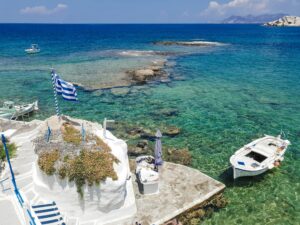To live in Greece without working, retirees and financially independent individuals can apply for the Financially Independent Persons (FIP) visa, granted to non-EU nationals who can prove a minimum passive income of at least €3,500 per month.
The Independent Means Visa in Greece offers long-term residency without requiring employment, making it an attractive option for self-sufficient expats.
Here’s what this guide will cover:
- How much money do I need to get residency in Greece?
- What is a financially independent person visa for Greece?
- Pros and cons of the independent means visa in Greece?
- Who is eligible for independent means visa in Greece?
My contact details are hello@adamfayed.com and WhatsApp +44-7393-450-837 if you have any questions.
The information in this article is for general guidance only. It does not constitute financial, legal, or tax advice, and is not a recommendation or solicitation to invest. Some facts may have changed since the time of writing.

How many types of visas are there for Greece?
- Schengen (Type C) Visa: This short-stay visa allows non-EU visitors to stay in Greece (and other Schengen countries) for up to 90 days within a 180-day period. It is commonly used for tourism, business trips, or visiting family and friends. It does not permit employment.
- National (Type D) Visa: Also known as a long-stay visa, this is issued for stays longer than 90 days. The Type D visa covers a wide range of purposes including employment, study, research, family reunification, and long-term residence.
- Work Visas: These are specific subcategories under the Type D visa, granted to foreign nationals who have secured a job offer from a Greek employer or are being transferred within a multinational company. Work visas require approval from both the consulate and Greek labor authorities.
- Student Visas: Designed for non-EU nationals enrolled in accredited educational programs in Greece. Applicants must show proof of admission, sufficient funds, and health insurance.
- Golden Visa: A residency-by-investment program granting a renewable 5-year residence permit to non-EU citizens who invest at least €250,000 in Greek real estate. It also extends to immediate family members and offers visa-free travel within the Schengen Zone.
- FIP Visa (Financially Independent Person): Often referred to as the Independent Means Visa in Greece, this long-term visa is for non-EU nationals who can demonstrate a stable, passive income (usually from pensions, investments, or rentals).
What is a FIP visa for Greece?
The Greek FIP visa is a long-stay national visa (Type D) that grants legal residency in Greece to individuals who can support themselves without local employment.
This visa is often seen as the country’s equivalent of an independent means or non-lucrative visa.
Holders may apply for a residence permit after entering Greece, which allows for annual or biannual renewals and access to long-term residency options.
How do I qualify for a FIP visa in Greece?
To qualify for the FIP visa, applicants must meet strict financial, legal, and residency-related requirements. Here’s what you need:
- Non-EU/EEA National: The FIP visa is only available to individuals who are not citizens of an EU or EEA member state.
- Stable Passive Income: You must prove that your income comes from non-employment sources such as pensions, rental properties, dividends, interest, or annuities. This ensures you won’t rely on the Greek job market to support your stay.
- Minimum Income Thresholds:
- At least €3,500 per month for the main applicant.
- An additional 20% per month for the spouse and 15% for each child.
- Proof of Income: You’ll need to provide recent bank statements, tax returns, pension slips, or other financial documents demonstrating the regularity and reliability of your income.
- Proof of Accommodation in Greece: This could be a long-term lease agreement, property ownership documents, or a notarized declaration from a host.
- Private Health Insurance: You must hold comprehensive private health insurance that covers both routine and emergency care within Greece. Public health coverage is not acceptable for this visa type.
- Clean Criminal Record: Applicants are required to submit a recent police clearance certificate (issued within the past 3 months) from their country of residence or citizenship.
Note for Remote Workers: Some Greek consulates may allow digital nomads to apply under the FIP visa as long as their income is earned from non-Greek clients or foreign companies.
However, Greece also offers a separate Digital Nomad Visa for this purpose, which may be a better fit for active remote employees or freelancers.
How much is the FIP visa for Greece?

Total estimated cost (excluding optional services) is approximately €1,680–€2,080.
If you include professional services, the total may rise to €2,500–€4,000 depending on your needs and the complexity of your case.
Here’s a breakdown of the typical expenses:
- Visa Application Fee – €180
This non-refundable fee is paid at the Greek consulate or embassy when you submit your initial visa application from your home country. - Residence Permit Fee – €1,000
Once in Greece, you’ll need to apply for your residence permit at the local immigration office (usually within 30 days). This fee is payable to Greek authorities and is required for the issuance of the long-term permit. - Translation and Legalization of Documents – €100–€300
All foreign documents must be officially translated into Greek and legalized (usually via apostille or consular certification). Costs vary depending on the number of documents and whether you use an official translator or a third-party service. - Health Insurance Premium – €400–€600 per year
Private health insurance is mandatory and must meet the coverage requirements set by Greek authorities. The premium varies based on your age, provider, and plan. - Optional Legal or Consultant Fees – €500–€2,000
While not required, many applicants hire immigration lawyers or relocation consultants to assist with the paperwork, translations, and appointments. This can greatly simplify the process, especially if you’re unfamiliar with Greek bureaucracy.
Keep in mind that these are one-time costs for the initial visa and first-year residence permit.
Renewal fees and ongoing insurance costs should be factored into long-term planning.
How long does it take for a Greece visa to be approved?
FIP visa processing times vary by consulate but typically range from 4 to 8 weeks.
After approval, you must travel to Greece within the visa’s validity window (usually 90 days) and apply for a residence permit.
What is the difference between FIP visa and golden visa in Greece?
| Feature | FIP Visa | Golden Visa |
| Financial Requirement | €3,500+/month income | €250,000+ real estate investment |
| Work Rights | No | No |
| Residency Type | Type D visa + residence permit | Permanent residency |
| Family Inclusion | Yes | Yes |
| Path to Citizenship | Yes (after 7 years) | Yes (after 7 years) |
What are the disadvantages of living in Greece?
- Bureaucracy
Administrative processes in Greece can be slow, outdated, and paperwork-heavy. Most tasks such as registering your residence, getting a tax number, or renewing a permit, often require multiple in-person visits and signed documents. Patience is essential when dealing with government agencies. - Limited English Outside Major Cities
While English is widely spoken in tourist areas and among younger Greeks, language barriers can be an issue in rural towns or when dealing with government services and healthcare professionals. Basic Greek language skills are helpful for daily life. - Healthcare Gaps in the Public System
Although Greece offers universal healthcare, public hospitals may be under-resourced and experience long wait times. Many expats opt for private insurance and clinics to ensure faster, higher-quality care, especially for non-emergency services. - Economic Instability
Greece has made significant progress since the debt crisis, but high unemployment rates and slow bureaucratic reforms still pose economic challenges. Pensions and public sector salaries can be unstable, which may affect residents relying on local sources of income. - Climate and Natural Hazards
Summers in Greece can be extremely hot, especially in inland areas and Athens, with temperatures often exceeding 40°C (104°F). Additionally, some parts of the country including Crete and the Ionian Islands are seismically active and experience occasional earthquakes.
Is Greece good for living?
Yes, Greece is widely considered a great place to live, especially for those seeking a relaxed lifestyle, affordable living, and a welcoming culture.
It offers:
- Affordable Cost of Living
Greece remains one of the most budget-friendly destinations in Western and Southern Europe. Rent, groceries, dining, and utilities are generally lower than in countries like France, Germany, or the Netherlands. - Excellent Quality of Life
With its Mediterranean climate, rich culinary tradition, scenic landscapes, and laid-back lifestyle, Greece offers a high standard of living. The emphasis on community, family, and work-life balance is attractive to many newcomers. - Friendly Culture and Deep History
Greeks are known for their hospitality and strong social networks. Whether you live in a coastal village or a busy city, you’ll likely experience a warm and welcoming local culture. The country also boasts thousands of years of history and countless archaeological sites to explore. - Access to EU Healthcare and Education
As a member of the European Union, Greece provides access to EU-standard healthcare and education services. Expats can also benefit from public and private international schools in major cities. - Well-Established Expat Communities
Cities like Athens, Thessaloniki, and Heraklion in Crete have growing expat populations, offering social networks, English-speaking professionals, and support services that make integration easier.
Conclusion
Greece’s FIP visa stands out for its accessibility and practical advantages compared to other European options.
While the process involves navigating local bureaucracy, many expats find the long-term benefits worthwhile.
With proper preparation and attention to documentation, the path to residency can be smooth and rewarding.
FAQs
What is the Greece visa rejection rate?
In 2023, the global rejection rate for Greek visas was 14.57%, based primarily on short-stay Schengen visa data.
Most rejections occur due to incomplete documentation or failure to meet financial requirements.
For long-stay national visas like the Financially Independent Person visa, approval depends heavily on submitting accurate paperwork, including proof of sufficient income or savings.
How does the FIP visa compare to other EU independent means visas?
Greece’s FIP visa has a lower income requirement than similar visas in Spain, Portugal, and France.
It’s also relatively easy to maintain and offers a pathway to residency with moderate tax exposure.
Is the FIP visa taxed in Greece?
You may be considered a tax resident after spending more than 183 days per year in Greece.
However, Greece offers favorable tax schemes for new residents, especially retirees and high-net-worth individuals.
Pained by financial indecision?

Adam is an internationally recognised author on financial matters with over 830million answer views on Quora, a widely sold book on Amazon, and a contributor on Forbes.



